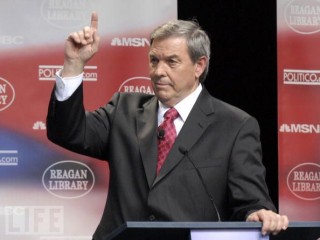
Hunter Duncan biography
Date of birth : 1948-05-31
Date of death : -
Birthplace : Riverside, California
Nationality : American
Category : Politics
Last modified : 2010-05-31
Credited as : Republican member , chairman of the House Armed Services Committee , First Lieutenant of U.S. Army
0 votes so far
Hunter was the chairman of the House Armed Services Committee during the 108th and 109th Congress. Hunter sought the Republican Party nomination for President of the United States for 2008, but his campaign failed to attract significant voters or delegates in early primary and caucus states, and he dropped out after the Nevada Republican caucuses.
He was succeeded as Representative for the 52nd district by his son, Duncan D. Hunter.
Perhaps the least recognizable name in the Republican race for the presidential nomination, Duncan Hunter has served in the House of Representatives for more than 25 years. Conservative politics run in his blood—his father Bob was an active supporter of the Republican Party in California.
Known for his pro-defense stance, Hunter has firsthand military experience. He served in the U.S. Army from 1969 to 1971 during the Vietnam War. In 1973, Hunter decided to use the G.I. Bill as the means to become a lawyer. He graduated from the Western State University Law School in 1976 and went on to establish a small storefront practice in a largely Hispanic neighborhood in San Diego.
In 1980, Hunter threw his hat into the political ring. He ran against incumbent Democrat Lionel Van Deerlin in a predominantly Democratic district. To the surprise of many, Hunter was able to beat the odds and emerged the winner. His victory was part of what is called the Reagan Revolution, which marked the rise of conservatism in America and led to the election of numerous Republican candidates, including Ronald Reagan as president.
During his tenure, Hunter has remained firmly pro-military, pro-life, and anti-free trade. As a member of the Committee on Armed Services, he lobbied for numerous defense projects over the years, including the Sea Fighter catamaran supply vessel and the DP-2 vertical-takeoff aircraft. Hunter has also been a strong supporter of military action in Iraq. His own son, Duane, is an Iraq war veteran, having served two tours as a member of the Marine Corps. He is actually running to fill his father’s congressional seat. On a key domestic issue, Hunter has consistently been against abortion in all cases and introduced the Right to Life Act. He has also been skeptical of the country’s free trade policies, especially in regards to China, saying that they are damaging to the U.S. manufacturing industry.
A staunch opponent of illegal immigration, one of Hunter’s most famous accomplishments was writing the law calling for the construction of a barrier on the U.S.-Mexico border between San Diego and Tijuana. The law was established to curtail drug smuggling and illegal immigration. After the terrorist attacks of September 11th, the government became increasingly concerned about border security. Hunter’s answer to this situation was to write the Secure Fence Act, which calls for the San Diego fence to be continued across the Mexican border in several states, including California, Arizona, New Mexico, and Texas. It was signed into law by President George W. Bush in 2006.
That same year, Hunter announced that he was forming an exploratory committee regarding a potential 2008 presidential run. A virtual unknown, one of his greatest challenges has been getting his name out there. He has had little media coverage compared to the leading candidates, Mitt Romney, John McCain, and Mike Huckabee.
In the first few contests of the race for the nomination, Hunter’s lack of name recognition and small campaign size was apparent. He seems to have barely made an impression on voters thus far. In the Iowa Caucuses on January 3, 2008, he received less than 1 percent of the vote. Two days later in Wyoming, Hunter came in third with 8 percent. But the hot-contested New Hampshire Primaries, he finished last with only 1 percent. Michigan was another sad story for Hunter—less than 1 percent again. He withdrew his bid in January 2008 and endorsed Mike Huckabee.
















